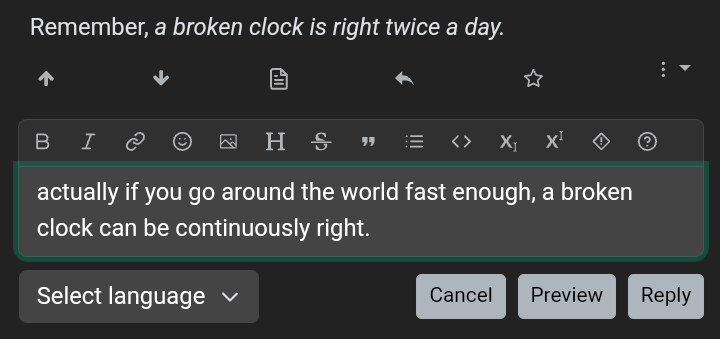this post was submitted on 18 Dec 2024
139 points (93.2% liked)
ShowerThoughts
2364 readers
2 users here now
Sometimes we have those little epiphanies in the shower.. sometimes they come from other places. This is a home for those epiphanies.
founded 2 years ago
MODERATORS
you are viewing a single comment's thread
view the rest of the comments
view the rest of the comments

It wouldn’t be that far from how it worked before the invention of the railways, each town had its own local time. https://en.m.wikipedia.org/wiki/Railway_time
The history of timekeeping is pretty interesting in itself.
In ye-olde-days before everyone had clock most of europe had flexible time. sunrise is at 6am, noon is when the sun is heighest, and sunset is at 6pm. 9 am is between soon and sunrise. Obviously that means during winter, an hour in the night is longer than an hour during the day, but nobody really cares about that anyway.
Then we got clocks, and they would generally be the church bell. So everywhere in hearing range of the church had a single timezone, whose accuracy would depend mostly on the clock they had and they'd synchronise that with noon occasionally. Of course, that clock would say something else from the old system. Sunrise is at 6 in the morning, or at 7.32 "on the clock" (o'clock). Of course most old clocks didn't have minute hands, or were in any way external, so it would be "roughly half past seven" at best.
The old system of church time turned into railroad time, and there are amazing paintings and photographs and museum pieces of a station that had 3 clocks: its own time, and the time of the next station in either direction. By this time, almost nobody nobody used the old "split daytime in 12" system anymore.
But then countries started to think they really needed to synchronise their timezone. So most countries picked a big church either in the capital or in a big city in the middle of the country and declared that to be the time in their country. The Netherlands, for example, decided in 1909 that they like GMT +0h 19m 32s and 13milliseconds. Germany picked GMT +1h. The Netherlands realized this was stupid in 1937 and moved to GMT +20m, for a very short time. Of course, the fact that a national time existed didn't stop many cities from sticking to railway time anyway, and for a short time, everyone had 2 different times again (if you didn't live in the capital).
And then between 1938 and 1940, basically all of europe was... motivated... to pick one timezone, which just happened to be the German one, and we stuck to it ever since.